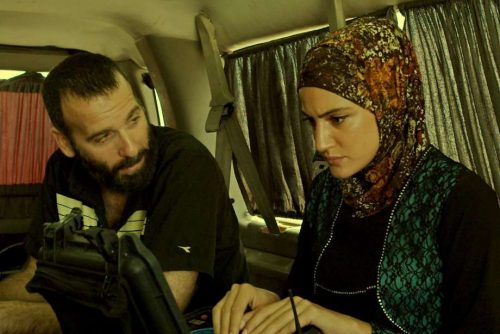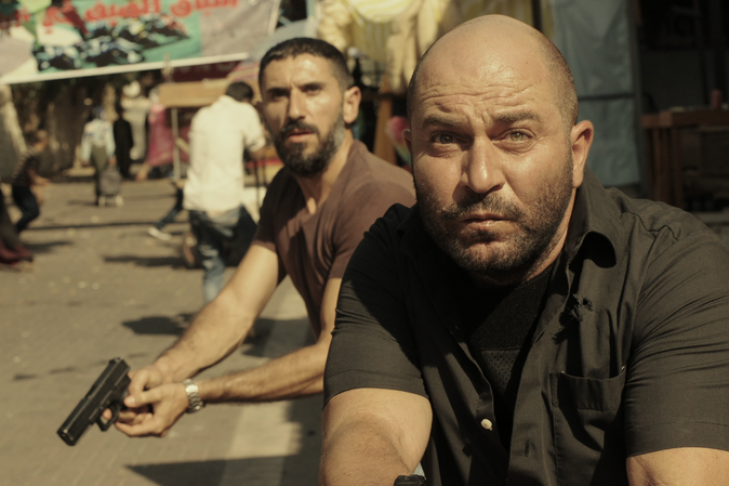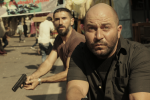“Fauda,” a show about a group of undercover agents infiltrating the West Bank, did not have an auspicious start. Two of Israel’s biggest television production companies did not see the entertainment value in dramatizing a conflict about which Israelis were at best weary. One of those companies, Keshet, which had a hand in producing the Emmy-award winning show “Homeland,” didn’t peg the same sort of success for “Fauda.”
Not willing to give up, Avi Issacharoff and Lior Raz, the creators of “Fauda,” brought their show to Yes, a satellite television provider. But Yes also had its reservations about the show’s subject. In the end, however, Issacharoff and Raz prevailed and the series became a surprise hit in Israel. The show took off internationally when Netflix signed on to stream two seasons. Netflix is now poised to air a third season of the show.
Raz stars as the main protagonist, Doron Kabilyo. Doron, who is in effect Raz’s fictional counterpart, works in a unit very similar to Duvdevan, the Israel Defense Forces counterterrorism unit where Raz did his compulsory military service. “Duvdevan” means “cherry” in Hebrew, and ironically as well as playfully alludes to the group’s cherry-on-top-of-the-sundae status. Like Duvdevan, the missions in “Fauda” are quick and discrete.
Raz has said in interviews that writing and starring in “Fauda” was therapy for him. After his time in Duvdevan, he suffered from post-traumatic stress disorder. The series enabled him to not only draw on his experiences during his years as a soldier in Duvdevan, but also presented him with the opportunity to reassess his time there.
In the first episode, viewers meet Doron, who is retired from the spy business and living on a small vineyard with his wife and two children. One afternoon, his former commander interrupts Doron’s self-imposed exile and taps him to kill Abu Ahmad, the Hamas terrorist Doron thought he assassinated the previous year. Doron, who is eager to settle this piece of unfinished business, relishes the opportunity to participate in one last mission.

Israeli and Palestinian characters that are complicated and often sympathetic populate the messy, complex life that is “Fauda.” In a highly unusual shift for Israeli television, terrorists have loving families and occasional self-doubts that humanize them. Viewers meet Abu Ahmad’s wife and children at his younger brother’s wedding. When the brother is gunned down in front of his bride, the grief-stricken woman signs on to be a suicide bomber. So much is interconnected on “Fauda”—the young woman blows herself up in a crowded nightclub in Tel Aviv where the girlfriend of one of the unit’s members tends bar. Then there are the ordinary Palestinians living under the occupation, giving Israeli audiences a look into the daily lives of its Arab neighbors.
Related
The show has also attracted the ire of the Boycott, Divestment and Sanctions movement. BDS demanded that Netflix cancel the series. According to Itay Stern of Haaretz, the group sent a press release that denounced the show as “racist propaganda for the Israeli occupation” and an “ostentation of aggression” against the Palestinians and their quest for liberation.
Despite various criticisms of the show, Issacharoff and Raz have been mostly pleased with the feedback they’ve received from Israelis and Arabs in the West Bank, Lebanon, Egypt and the Gulf. To that end, the third season will be written with more of an international audience in mind. As Raz recently told National Public Radio:
“I hope that [audiences] will see that there is—and not just Americans, I think for everyone who’s watching the show—that they have to understand that there is a price for a war, and the people [in] the field are paying this price, [whether] it’s a mental or physical price. But also the people who [are] surrounding them—their families, their friends, everyone is paying a price for the action of people who are in the battle zone. It doesn’t matter if it’s in Israel, in Afghanistan. And [for] the people who are there: It’s much more complicated than we think.”





